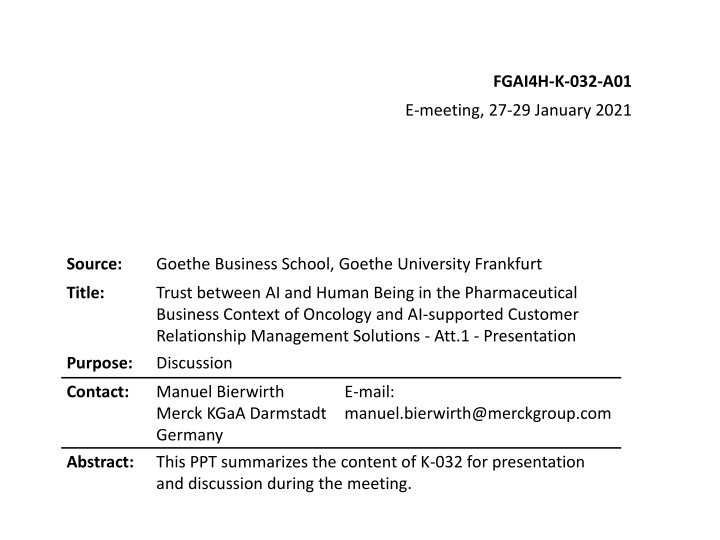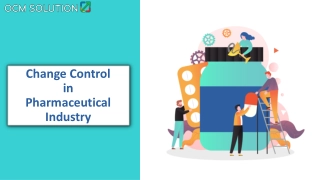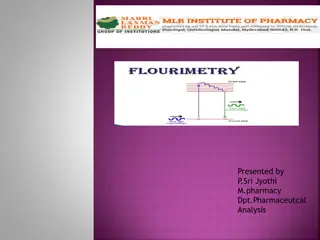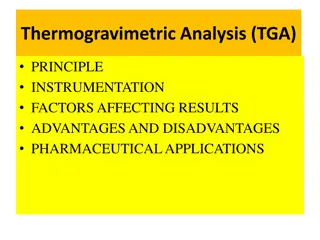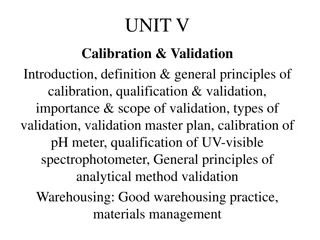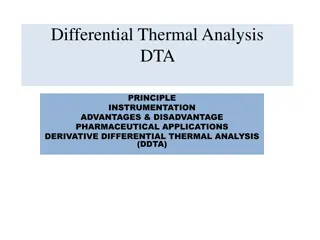Trust Dynamics in AI-Powered Pharmaceutical Business: A Critical Analysis
Exploring the intricate relationship between AI and human trust in the context of the pharmaceutical industry, this presentation delves into the factors influencing trust dynamics and proposes implementation strategies to foster trust between sales representatives and oncologists in AI-supported tools. Highlighting the rising significance of AI in pharma, the discussion also touches upon the transformative role of AI systems in workforce integration and the imperative need for establishing trust in this evolving landscape.
Download Presentation

Please find below an Image/Link to download the presentation.
The content on the website is provided AS IS for your information and personal use only. It may not be sold, licensed, or shared on other websites without obtaining consent from the author.If you encounter any issues during the download, it is possible that the publisher has removed the file from their server.
You are allowed to download the files provided on this website for personal or commercial use, subject to the condition that they are used lawfully. All files are the property of their respective owners.
The content on the website is provided AS IS for your information and personal use only. It may not be sold, licensed, or shared on other websites without obtaining consent from the author.
E N D
Presentation Transcript
FGAI4H-K-032-A01 E-meeting, 27-29 January 2021 Source: Goethe Business School, Goethe University Frankfurt Title: Trust between AI and Human Being in the Pharmaceutical Business Context of Oncology and AI-supported Customer Relationship Management Solutions - Att.1 - Presentation Purpose: Discussion Contact: Manuel Bierwirth Merck KGaA Darmstadt Germany E-mail: manuel.bierwirth@merckgroup.com Abstract: This PPT summarizes the content of K-032 for presentation and discussion during the meeting.
Trust between AI and Human Being in the Pharmaceutical Business Context of Oncology and AI- supported CRM Solutions* An Analysis of the Trust Factors Influence and An Implementation Proposal to Establish Trust of Sales Reps and Oncologists in AI-supported Tools Manuel Bierwirth, January 15, 2021 Merck KGaA Darmstadt, Germany *Original title of the master thesis (submitted to Goethe University Frankfurt, Nov 11, 2020): Trust between Artificial Intelligence and Human Being in the Pharmaceutical Business Context of Field Force and AI-supported Customer Relationship Management (CRM) Solutions; The trust factors in the ranking table and in the implementation proposal are a selection from the original thesis, author: Manuel Bierwirth; Figures are used for educational purposes; Citing details are included in FGAI4H-K-032.
Team, welcome to our weekly team meeting and welcome to our new team member AI , Hello AI , AI would you mind introducing yourself? AI potentially becomes a new teammate Businesses are asked to establish a cooperation if we work with AI, we have to trust in AI trust factors -> trust building -> implementation proposal Trust between AI and Human Being | January 2021 3
AI in PHARMA Increasing Importance of AI Including Pharmaceutical Business AI systems are already part of today s workforce. They are supporting production forecasts, delivery route optimizations The AI systems have released workers from repetitive and time- consuming elements of their work, giving them time back for creativity, complex problem- solving (Hanson 2019) AI within Digital Transformation: Global sales with AI in healthcare (Statista 2019) by 2022, 60 % of the GDP will be digitally transformed (WEF) we are on the edge of the golden age [of AI]. (Jeff Bezos; CEO, Amazon) There are various reasons to follow this trend, internal reasons cost drivers replacing processes with high automation potential (Gentsch 2019), or externally forced like a worldwide pandemic COVID-19 Trust between AI and Human Being | January 2021 4
Research questions and methods Research questions and methods of the master thesis Research questions: Which factors influence trust and how can trust between AI and human beings (here sales reps) be established and/or improved? Research methods: Literature review: A deductive research approach was applied, which focuses on the formulation of a hypothesis based on existing theory and testing of the hypothesis during the research process Qualitative interviews: To understand from experts if there are other factors outside the literature perspective which are relevant in human-AI and human-machine collaboration, a further method of qualitative interviews was added Trust between AI and Human Being | January 2021 5
Trust human-human Trust model human-human ABCD Trust Model (Blanchard) Private and Professional relationships - Able (competence and skills) - Believable (Act with integrity) - Connected (Care about others) - Dependable (Demonstrate what you say) In professional relationships (Schmiedel 2017), example Manager and employee, Trust building and maintenance through - The development of employees is essential - Also, a culture where an employee is permitted to make mistakes is fruitful for trust building Trust illustrated: The manager securing the employee. Adapted illustration based on (Schmiedel 2017, p.3) Trust between AI and Human Being | January 2021 6
Limitations and Trust participants Findings: Gap analysis from literature Participants: Human + AI + AI-Designer and what about the Oncologist? Limitations of human-AI and human-machine relationships found in literature (excerpt): 1. Situational decision making: the machine is not capable to bring in human understanding and thoughts like situational decisions (Schenkelberg 2020) 2. A hormone release, like the creation of oxytocin can only happen on the human side, but not on the machine side of the relationship. But in a stressful situation still a trustful situation human-machine can happen 3. Trust parties in the trust model human-AI (Tschopp Ruef 2020): Sales rep (works with AI), AI, AI-Designer Proposal to enhance the three trust parties' model of Tschopp and Ruef with one additional trustor as participant: the HCP Additional participant Usage of same AI? Whose AI? And AI s interaction? Enhanced model Trust between human-AI with four participants: Sales rep, AI-System, AI- Designer, HCP. Adapted illustration based on (Tschopp and Ruef 2020) Trust between AI and Human Being | January 2021 7
Trust factors HUMAN-AI Relevance Ranking Findings: Relevance Ranking, Trust Factors for Sales Reps & Oncologists (Selection) I Most important trust factors for the human and AI teammate for projects where human sales reps and AI form a collaboration. The ranking is divided into three ranking groups (RG): 1. Very important , 2. Important , 3. Relevant but with lower impact What does it mean to the sales rep or oncologist and implementation feasibility Factor Source RG Ability & performance Literature (Hancock et al. 2011) & interviews (appendices 3-6) Literature (Hancock et al. 2011) & interviews (appendix 4) Literature (Blanchard et al. 2013) & interviews (appendix 4) Literature (Hancock et al. 2011) & interviews (appendix 4) Sales reps or Oncologist will gain trust if the algorithm works and the results presented by AI are useful 1 Sales reps will benefit from suggestions which are believable Believability 1 Connectedness & feedback exchange Dependability Sales reps will gain trust if future processes and suggestions of AI will incorporate feedback, which will continuously be collected from sales reps Sales reps will maintain trust whether the output from the AI-based system remains dependable over time 1 1 Trust between AI and Human Being | January 2021 8
Findings: Relevance Ranking, Trust Factors for Sales Reps & Oncologists II What does it mean to the sales rep and implementation feasibility Factor Source RG Self-confidence & perceived risk of using the machines versus the perceived benefit factor Literature (Hancock et al. 2011) & (Ososky et al. 2013) Sales reps can check their self-confidence on specific tasks, as in human-robot team tasks, there may be sub-tasks for which robot performance is poor, but human performance is worse, an assessment of human and robot performance is necessary, given situational factors, to allocate tasks to the best team member (Lee and Moray 1994) To understand machines and AI abilities and to avoid overestimation and underestimation, a shared mental model needs to be introduced which allows the sales rep to understand the AI capabilities. The mental model can support the sales rep and the sales manager to have appropriate trust in AI-based systems and help with the decision to involve or to not use the system for specific tasks 1 Shared mental models Literature (Ososky et al. 2013) 1 Technical skill and habit constraints Interviews (appendix 4) In the community of HCPs but also in field of sales reps we can find individuals which are not technology experienced or do not use technology platforms, tools or smartphone apps except for email communications. There will be sales reps more open to AI-based recommendation systems, but some sales reps will have issues as they traditionally work with their own notes and handwritten data. Only if all sales reps jointly invest time and show willingness to AI- based systems supporting their business, the AI system can learn and improve from feedback, data entries and data corrections 1 Trust between AI and Human Being | January 2021 9
Findings: Relevance Ranking, Trust Factors for Sales Reps & Oncologists III What does it mean to the sales rep and implementation feasibility The AI-based tool and purpose needs to be clearly explained to the target audience, the sales reps as part of the field force. Sales reps need to be educated in functionality and planned usage of the system provided results and reports to ensure sales reps trust into the process and to ensure sales reps cooperation. Sales reps need to understand that the tools will be introduced to support and not to replace them Automation cannot replace face-to-face contacts by 100 %, acceptance and trust will be increased if the tools still allow and suggest physical collaboration of the sales rep with the HCP. It can be a mix of face-to-face contacts and other digital channels Training of the user audience, sales reps and sales managers, is of utmost importance to make sure that all potential users understand the capabilities of the AI-based systems and to ensure that the systems are used in the right way and results are interpreted correctly Sales reps will build up trust in the AI, if their country specific culture is incorporated in the logic of the algorithm or in the presentation and wording Factor Source RG Purpose (control tool?) Interviews (appendix 5) 1 Face to face remains vital Interviews (appendix 5) 1 Training Interviews (appendix 5) 1 Culture Literature (Aerts and Mitchell 2020) 2 Trust between AI and Human Being | January 2021 10
Findings: Relevance Ranking, Trust Factors for Sales Reps & Oncologists IV What does it mean to the sales rep and implementation feasibility Factor Source RG Low / High competence setup and over-trusting, under-trusting, proper trusting & trust over time Literature (Freedy et al. 2007) Increasing trust of the sales rep by setting up a low machine competence in the beginning, will lead to increased trust over time and several trials, e.g. because wrong results are even accepted and trusted as the human expects them to happen. Training cases for the sales reps with machine intermediate competence should be preferred to cases with low or high competence to avoid the creation of bias of either perfectionism or high error-proneness 2 Reputation & the role of the technology provider Literature (Siau and Wang 2018) A technology provided by an institution with a high reputation to gain trust from others will have it easier to be accepted and trusted than if it comes from an institution with a low reputation. On the other side new companies can also build a reputation, especially in technology, newcomers are perceived as innovators 2 Representation and Anthropomorphism Literature (Phillips et al. 2012) & (Hancock et al. 2011) The physical representation of autonomous systems and machines in confidence inspiring animal pet like form can increase trust (Phillips et al. 2012). In the sales rep and oncologist use case, the appearance of the AI is restricted to an appealing and modern iPad device and anthropomorphism is not relevant 3 Trust factors for trust building are part of an implementation proposal: how to ensure trust of human users in AI-supported projects Trust between AI and Human Being | December 2020 11
Q&A Thank you very much Trust between AI and Human Being | January 2021 12
